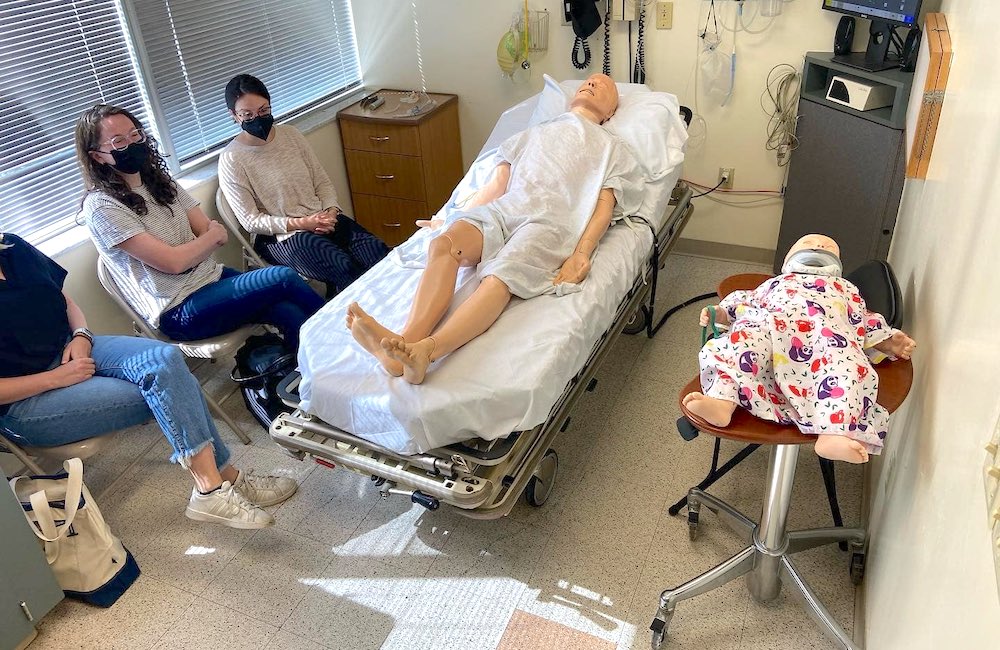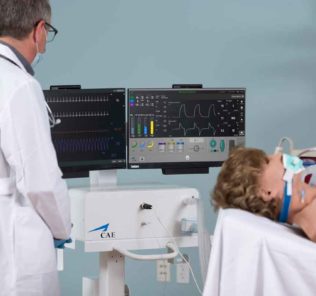WISER Medical Student Bootcamp Educates Fourth-Year Specialty-Track Learners
Throughout the years of medical school, learners are presented with vast amounts of information in anticipation of real-world patient care scenarios. The practice of healthcare simulation across these academic environments has greatly assisted the way in which they are able to learn healthcare-related methods, techniques, and principles. However, with a seemingly endless amount of information to be learned, extra practice – especially focused on specialty tracks – can be largely beneficial. This is why the Winter Institute for Simulation Education and Research (also known as WISER) organized a medical student bootcamp designed for fourth-year learners who are transitioning into their residency programs.
With participants and specialty-specific faculty instructors from the University of Pittsburgh School of Medicine, WISER’s bootcamp began on Monday, April 25, and ran until Friday, May 13. The bootcamp was held on the WISER Main (Oakland) campus and consisted of healthcare simulations, lectures, and task trainer sessions.
Four specialty tracks covered during the bootcamp included anesthesia, emergency medicine, internal medicine, and OBGYN/Peds. In addition to participating in these clinical simulations and task training sessions, the final week of bootcamp included all learners running their own medical simulation scenarios.
Sponsored Content:
“As a (relatively) new WISER staff member, it was very impressive to see a fourth-year medical student bootcamp run this way,” said Diana Alberti, WISER Director of Administration. “The inclusion of student-created scenarios and the length of the bootcamp helped create a comprehensive, effective bootcamp. As a former operations specialist, it was also very cool to watch the way the operations team came together to conduct such a smooth, intensive event over those three weeks.”
“It ran pretty smoothly and was very organized,” added Martin Mayer, WISER’s manager of simulation services.
While this was the fourth year that the bootcamp was hosted in this 3-week format, previous iterations of the experience did not include specialty tracks, task trainer sessions, or student-created scenarios. This year’s bootcamp was also only the second in-person medical student bootcamp hosted by WISER since the onset of the coronavirus pandemic. Here are some additional images from the bootcamp:
Sponsored Content:
Additional Healthcare Simulation WISER Articles:
-
- DEI Call to Action: The Importance of Racial Equity Across Simulation Leadership
- The Role of Simulation: Getting WISER on Diversity, Equity, and Inclusion
- WISER Expands, Adds Two Healthcare Simulation Satellite Centers
- Improving Simulation Instructional Methods (iSIM) Course Returns to WISER for In-Person Trainings
- WISER Launches Simulation Center Management System, SIMS 3.0
WISER Clinical Simulation Courses
Simulation education courses at WISER can be browsed by participant type, CME courses, or by the department. Departments include anesthesiology, cardiology, cardiothoracic surgery, children’s hospital, critical care medicine, biological sciences, advanced practice providers, pharmacy, internal medicine, pulmonary, allergy, and critical care medicine, emergency medicine, graduate nursing, undergraduate nursing, nursing CME, obstetrics, gynecology, and reproductive services, pediatrics, rehabilitation, psychology, radiology, dental medicine, and surgery. Each department offers a number of medical simulation courses to increase knowledge and understanding pertaining to that area of study.
WISER presents a number of courses for simulation educators and administrators as well. These courses are designed to help these simulation professionals take their simulation training to the next level. These courses include:
- iSim
- Designing or Enhancing Your Simulation Center
- Facilitator Training Series: Introduction to Debriefing
- How to Run a Successful Simulation Center
- Healthcare Simulation Operations Specialist Training Program (TechSim)
More About WISER
WISER is a world-class multidisciplinary healthcare simulation training and research facility out of UPMC. An institute of the University of Pittsburgh Medical Center, the WISER Simulation Center’s mission is to conduct research and training programs utilizing clinical simulation-based education to increase patient safety at the UPMC and the school’s affiliates. The UPMC WISER facility is directed by Dr. Paul Phrampus, MD, who is also a professor in the Departments of Emergency Medicine and Anesthesiology at the University Of Pittsburgh School Of Medicine.
In addition to improving patient safety, the facility is dedicated to the advancement of healthcare simulation and education to promote education, mentorship, systems design, and research to enhance the high-quality delivery of healthcare. To achieve this outcome, WISER works to enhance patient safety through state-of-the-art educational and assessment methodologies and techniques. The facility also creates innovative education programs for healthcare providers ranging from students to practicing professionals.
WISER History
In the early 1990s, Dr. Peter Winter, chairman of the Department of Anesthesiology and Critical Care Medicine at the University of Pittsburgh, realized the importance of establishing a simulation center for training department personnel. The simulator obtained for this purpose was essentially the only one available at the time and came at the cost of over $250,000. The department obtained computers and other additional equipment, and in 1994 the simulation centre was launched on the third floor of Montefiore University Hospital.
Arrangements were made to simulate an operating room, an ICU bed, or a bay in the emergency department. Anesthesia machines, monitors, and ventilators completed the picture. Over the next four years, a number of faculty members worked to develop a broad range of curricula, using performance evaluations including Internet, CD-ROM, Palm-based, and digital video-based components.
In 1996, Drs. Renæ Gonzales (director from 1994-1996) and John Schaefer (director 1996 – 2005) designed and patented a difficult-airway simulator that was more functional, affordable, and portable than the full-sized version. A Texas company, Medical Plastics Laboratory, later acquired by the Laerdal Corporation, undertook commercial manufacture of this new simulator (AirMan) that has also been incorporated into a “full-scale” human simulator (SimMan).
Learn More About the WISER
Lance Baily, BA, EMT-B, is the Founder / CEO of HealthySimulation.com, which he started in 2010 while serving as the Director of the Nevada System of Higher Education’s Clinical Simulation Center of Las Vegas. Lance also founded SimGHOSTS.org, the world’s only non-profit organization dedicated to supporting professionals operating healthcare simulation technologies. His co-edited Book: “Comprehensive Healthcare Simulation: Operations, Technology, and Innovative Practice” is cited as a key source for professional certification in the industry. Lance’s background also includes serving as a Simulation Technology Specialist for the LA Community College District, EMS fire fighting, Hollywood movie production, rescue diving, and global travel. He and his wife live with their two brilliant daughters and one crazy dachshund in Las Vegas, Nevada.
Sponsored Content:




















